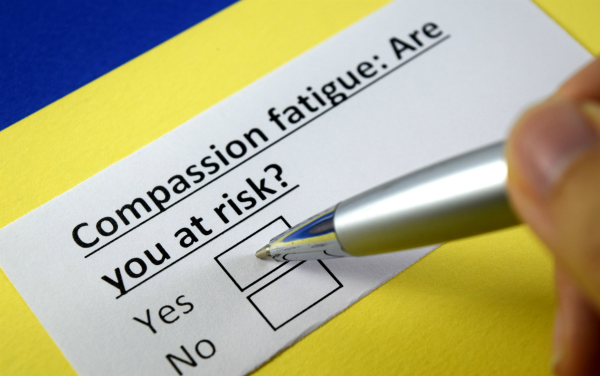
By Kate Snowdon, assistant content editor
It’s perhaps not surprising that Community Care Inform’s guide to secondary trauma in practitioners has been read so widely over the summer months on Inform Children and Inform Adults. We know that in addition to longstanding heavy workloads and stretched budgets, working to support and protect people who are living in difficult and distressing circumstances or have experienced abuse and trauma is an inherent part of the job, and can take an emotional toll.
But practising during the coronavirus outbreak, when teams are depleted and families and individuals are under more strain than usual, is making a challenging role harder for many.
While Community Care Inform is a subscription-based resource (see below), we have now made this guide freely available to everybody. to thank all social workers and care staff for the incredible work that you continue to do and help you look after your own wellbeing when under extra strain.
Download the secondary trauma guide.
What’s in the guide?
The guide is written by Lori Goossen, who has been a social worker for more than 25 years and has practised social work in Canada, the US and the UK. She is currently the principal child and families social worker for Medway Council and has been delivering workshops on secondary trauma for more than eight years. The guide includes:
- the key differences between secondary trauma and stress and burnout;
- the effect that secondary trauma has on you as a person and a professional, on your organisation and on service users;
- tips on how you can reduce its impact.
In the introduction, Goossen emphasises that social workers are continuing their normal work and more throughout a unique crisis, and are having to manage first-hand secondary trauma that arises from the events of the last year, particularly the increased incidences of abuse, poverty, and mental illness. Goossen reminds us that “it is vital for practitioners to acknowledge this is a hazard of helping and take time for self-care”.
We are providing this resource to complement organisational support. As the guide says, organisations must acknowledge the impact of the work on their staff and provide education, support, and a safe working environment to support staff to work more effectively. Equally, there has never been a more important time to practice self-care and self-compassion.
Download the guide on recognising and managing secondary trauma.
More from Community Care Inform
 Community Care Inform Children and Community Care Inform Adults are subscription websites providing practice guidance, legal information and learning tools in an accessible format. If you have a licence through your employer or institution, you might also find the links below particularly useful at this time.
Community Care Inform Children and Community Care Inform Adults are subscription websites providing practice guidance, legal information and learning tools in an accessible format. If you have a licence through your employer or institution, you might also find the links below particularly useful at this time.
On Inform Adults
Self-care and Covid-19: podcast and transcript
Developing emotional resilience and wellbeing in practitioners
Webinar: emotional resilience and how to develop it
Quiz: test your own emotional resilience
Use of self and emotional intelligence: quick guide for practice educators
Stress management: a guide for managers
Fear and social work: podcast and transcript
Loneliness and isolation during the pandemic: podcast and transcript
On Inform Children
Self-care and Covid-19: podcast and transcript
Developing emotional resilience and wellbeing in practitioners
Webinar: emotional resilience and how to develop it
Quiz: test your own emotional resilience
Use of self and emotional intelligence: quick guide for practice educators
Stress management: a guide for managers
Fear and social work: podcast and transcript
Loneliness and isolation during the pandemic: podcast and transcript
Not sure if you have a licence? A large number of local authorities and universities work with us so ask your manager, principal social worker or learning and development team if you already have access, or contact our helpdesk by email or phone (0203 915 9444). You can also enquire about new subscriptions.
You can see extracts or tasters of other CC Inform resources here.






 Bournemouth, Christchurch and Poole
Bournemouth, Christchurch and Poole  Hampshire County Council
Hampshire County Council  Lincolnshire County Council
Lincolnshire County Council  Norfolk County Council
Norfolk County Council  Northamptonshire Children’s Trust
Northamptonshire Children’s Trust  South Gloucestershire Council
South Gloucestershire Council  Wiltshire Council
Wiltshire Council  Wokingham Borough Council
Wokingham Borough Council  Children and young people with SEND are ‘valued and prioritised’ in Wiltshire, find inspectors
Children and young people with SEND are ‘valued and prioritised’ in Wiltshire, find inspectors  How specialist refugee teams benefit young people and social workers
How specialist refugee teams benefit young people and social workers  Podcast: returning to social work after becoming a first-time parent
Podcast: returning to social work after becoming a first-time parent  Podcast: would you work for an inadequate-rated service?
Podcast: would you work for an inadequate-rated service?  Family help: one local authority’s experience of the model
Family help: one local authority’s experience of the model  Workforce Insights – showcasing a selection of the sector’s top recruiters
Workforce Insights – showcasing a selection of the sector’s top recruiters 

 Facebook
Facebook X
X LinkedIn
LinkedIn Instagram
Instagram
Comments are closed.